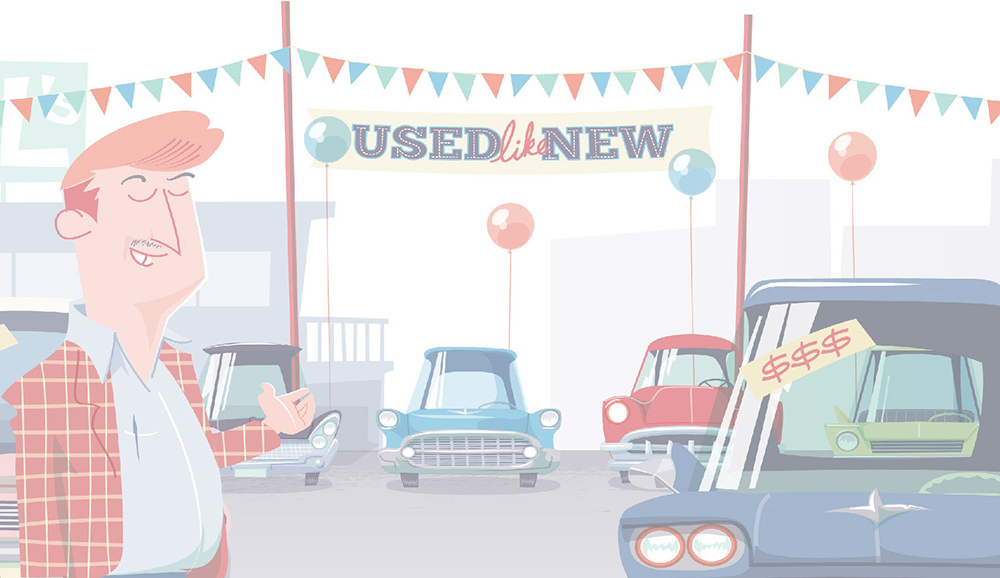There are two schools of thought when creating cash flow for a buy here pay here auto dealership. One involves selling cars as quickly as possible and repossessing them just as quickly. The other more viable option is to focus on customer service. By keeping customers in a vehicle longer, the dealer can also secure steady cash flow and support repeat customers as well as referrals. Dealers, collections staff and service technicians are all involved in the customer experience. This article reviews the benefits of a customer-centric approach to cash flow and financial management and the tools that help dealers achieve more profitable payment streams.
Customers at buy here pay here lots may be down on their luck or simply looking for a short-term solution to their transportation needs. Regardless, the industry norm of high default rates has inspired some dealers to manage cash flow through repossession. They sell cars quickly and repossess them just as quickly — only to resell them again. A customer who fails to pay is an opportunity rather than a liability.
And yet, dealers interested in stronger financial management are choosing an alternative. It’s called customer service. Before we go down the road of discussing transient, hard-to-reach clientele, abandoned cars and months of missed payments, let me say that customer service in the buy here pay here world means something different than your average retail scenario. The ultimate goal is to secure a longer stream of monthly payments per customer — knowing that very few loans will get paid in full.
Change Your Service Mindset for Buy Here Pay Here Dealerships Customer Service
 If a dealership is operating on the repossession model, it will take time to develop a focus on customer service. First of all, the sales process must shift from a focus on getting the car sold to a focus on learning about the customer. Each customer will have unique expectations, needs and approaches to problem solving and communication. This information will be important if the dealer’s mindset is now to keep the customer in a car and to collect payments.
If a dealership is operating on the repossession model, it will take time to develop a focus on customer service. First of all, the sales process must shift from a focus on getting the car sold to a focus on learning about the customer. Each customer will have unique expectations, needs and approaches to problem solving and communication. This information will be important if the dealer’s mindset is now to keep the customer in a car and to collect payments.
For example, a dealer may explain up front that the customer has a full or limited warranty on any mechanical repairs for a set period of time. This option is designed to keep in contact with the customer and make small repairs to avoid bigger ones. Frequently, a broken down car equals stopped payments. Instead, the dealer offers to make repairs, eliminate this common excuse for non-payment and stay in contact with more customers.
Other examples of establishing regular communication and service include offering regular spot checks on the vehicle, letting customers upgrade to a nicer model and keep payments the same. Dealers may also offer to pick up a vehicle free of charge if it breaks down. While it seems that all the work and expense is on the dealer’s side, the benefit of extra service is to sustain thousands in payments each month while reducing the need to sell as many cars per month.
At the same time, the customer may feel more loyal for the help provided…and refer friends and family.
Get Your Team on Board for Customer Service Changes
For this customer-centric approach to work, the dealer must get buy-in from the entire team. This includes reception and collections staff and service teams. If, for example, the collections staff is now focused on keeping a customer in a vehicle rather than repossessing it, their communications style has to change. They also must communicate with customers as soon as a payment is missed rather than waiting 60 to 90 days to meet legal requirements for repossession.
Collections staff must be trained to ask more questions when calling about missed payments and to show sympathy by offering some solutions. They can ask the customer to come in and make a payment. They can offer a discount if the payment is made within the week. If the car is broken down, they can discuss repair options. Sometimes it is helpful to review the payment history and the customer’s income arrangements to discuss paying ahead when cash flow is healthy and then having a couple weeks or months of no payments when cash flow is thin.
Service technicians must provide a cordial environment to support the customer relationship. Their goal has changed from getting a job done to keeping a customer happy.
Follow a Consistent Strategy
A dealership cannot focus on repossession and also provide good customer service. A consistent, customer-centric approach looks more like this:
- Review all existing customers on a weekly basis and identify which customers are currently behind on payments.
- Contact customers and invite them to the dealership to talk about getting current on payments.
- Offer a list of options that can support up-to-date payments.
- Once customers visit the dealership, provide a welcoming experience that demonstrates your interest in keeping the relationship.
- Outline a plan to continue the payment stream:
- Get the vehicle in and inspect it or make repairs
- Provide a discount
- Add missed payments or big repairs on the end of the existing loan
- Get customers into another vehicle through refinancing
- Adjust the payment schedule to support changes in circumstances
- Follow up and stay in contact through in-person visits as much as possible.
- Monitor payment habits and communicate as soon as there is a change.
Once the customer-centric approach is in place and working consistently, dealers can start to calculate how many customers making regular monthly payments are needed to support a consistent budget and profit margin. This can help dealers plan ahead by creating a fund to cover customer vehicle repairs, upgrade the service area or advertise. This consistent approach can also reduce the required quota on new sales per month, and therefore investment in new inventory.
If you think this approach could work better for your dealership in the long run, talk to the auto dealership team at Cornwell Jackson. To learn more, download the full article here.
Mike Rizkal, CPA is the audit and assurance partner in Cornwell Jackson’s assurance practice and auto dealership segment. Mike utilizes his real world practical experience to provide consulting and accounting services to buy here pay here owners and managers across North Texas.




